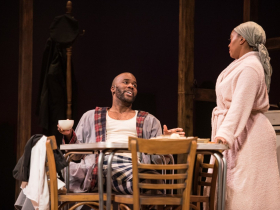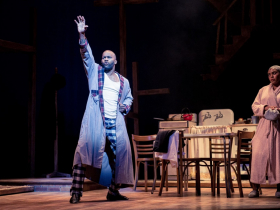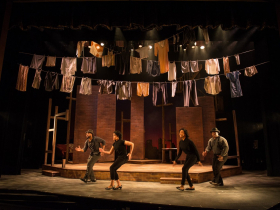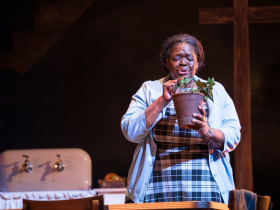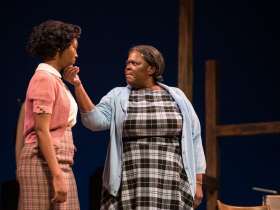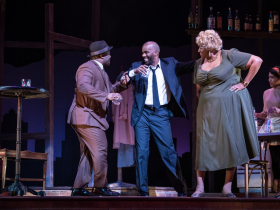Skylight Stages 1970s Musical ‘Raisin’
But the musical version often loses power of watershed play ‘Raisin in the Sun.’
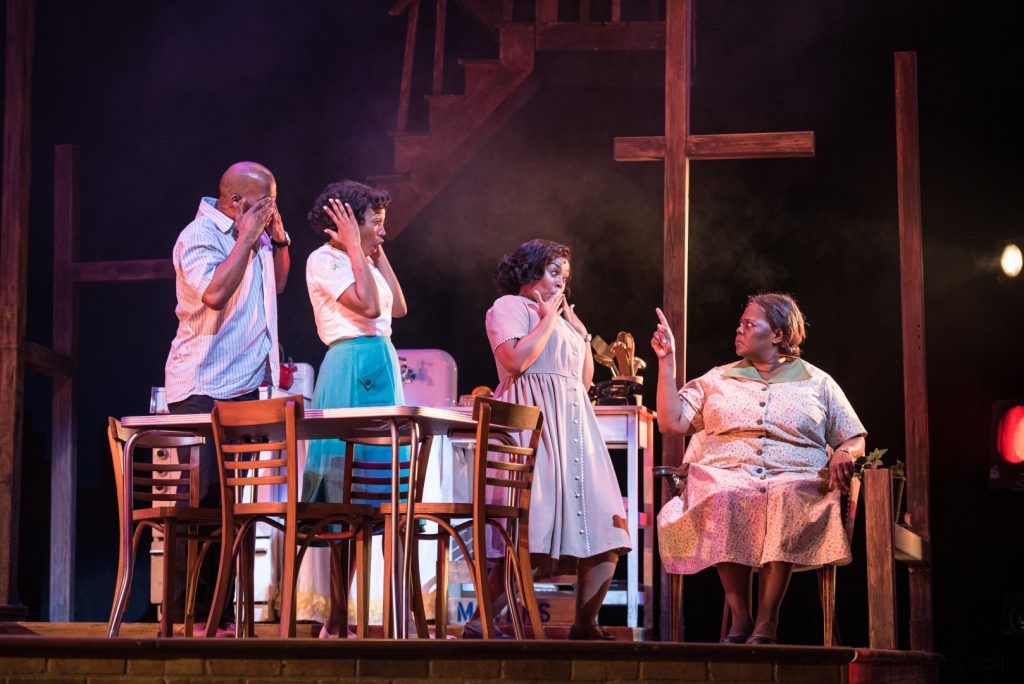
(l. to r.) J. Daughtry (Walter Lee Younger), Camara Stampley (Beneatha Younger), Melanie Loren (Ruth Younger) and Wydetta Carter (Lena Younger (Mama)) in Skylight Music Theatre’s production of Raisin running April 8-24, 2022. Photo by Ross Zentner.
Lorraine Hansberry’s classic A Raisin in the Sun has been a touchstone for me in both film and stage versions, including seeing the original Mama Younger, Claudia McNeil, in Milwaukee more than a half century ago.
But I had never seen the musical version Raisin, which won a Tony in the 1970s and has now been re-created with Broadway stage flourishes by the Skylight Music Theatre through April 24 at the Cabot Theatre.
An extension into song of this memorable family – angry greedy chauffer Walter, his tolerant wife Ruth, his sister Beneatha who wants to be a doctor, the Nigerian who courts her, and the force-of-life Mama, whose late husband has left her the money the family is counting on — seemed on the surface a normal expansion of the good vibes from this proud Black family as it takes on injuries to self-worth and the bigotry that, dare we say, still surrounds them. Hansberry had made a considerable effort to make us feel for this family before their racial troubles inserted itself into the story.
It could even be argued that it was a firm commercial decision to use the smooth jazz vibes and budding funky sounds of the 1970s to tell the original tale. Certainly, instrumental musical skills are well realized by music director Christie Chiles Twillie and her hidden tight band, but the fact that the singers must frontally assault the drawn-out words and strident emotional edge required of their voices cannot be hidden. Many of the attempts to draw out the feelings in music were not satisfactory.
The words and inspiring speeches of the Hansberry original still carry the weight and the audience involvement. The music is often an intrusion that slows down or delays the realizations coming over the audience.
Director Kenneth L. Roberson has a tendency to over-choreograph and drag in dance support from the wings, but the actors do bring this number off. Problem is, I am plucking three out of 19 numbers that work, plus an old-fashioned revival stomp to open Act 2, “He Come Down This Morning.” Most of the music turns out to be intrusive rather than expansive.
Loren’s Ruth is most effective the closer to the original play she stays, since she is too often pushing a pleasant singing voice (just as Daughtry’s extensive vocal experience dominates his acting portrayal). Stampley looks and acts Beneatha well and sings pleasantly, though she and the personable Denzel Taylor as love interest Asagai have to reach to find a loving harmony in their duets. Carter is a powerful presence but the extensive music she has tends to get in the way of the human power.
The technical elements deserve a salute. Christopher Rhoton’s set, mixing Chicago skyline silhouette, hanging laundry and doors that turn into crosses, certainly occupy the eye while Steve Tonar’s lighting suitably anticipates hovering gloom. The problem is too few opportunities to lighten the mood and like these people, though in acting terms Carter, Loren and Stampley have moments. An excellent singer much used by the Skylight, Raven Dockery enjoys her comic turn as the holier-than-thou Mrs. Johnson. But the production goes out of the way to drag in comic relief.
To emphasize its musical credentials, Raisin rushes through those moments of self-discovery that make the Hansberry original so successful, but it is not establishing its own reasons for existing despite a smooth but unremarkable musical overlay.
Raisin Gallery
Dominique Paul Noth served for decades as film and drama critic, later senior editor for features at the Milwaukee Journal. You’ll find his blog here and here.
Review
-
Eating Burmese in Bay View
 Dec 13th, 2025 by Cari Taylor-Carlson
Dec 13th, 2025 by Cari Taylor-Carlson
-
Casablanca Is a Milwaukee Success
 Nov 30th, 2025 by Cari Taylor-Carlson
Nov 30th, 2025 by Cari Taylor-Carlson
-
Oh, Those Witty 18th Century Brits
 Nov 24th, 2025 by Dominique Paul Noth
Nov 24th, 2025 by Dominique Paul Noth
Theater
-
Oh, Those Witty 18th Century Brits
 Nov 24th, 2025 by Dominique Paul Noth
Nov 24th, 2025 by Dominique Paul Noth
-
Skylight’s Holiday Show Is Lots of Fun
 Nov 16th, 2025 by Dominique Paul Noth
Nov 16th, 2025 by Dominique Paul Noth
-
Rep’s ‘Come From Away’ Is a Triumph
 Nov 10th, 2025 by Dominique Paul Noth
Nov 10th, 2025 by Dominique Paul Noth

